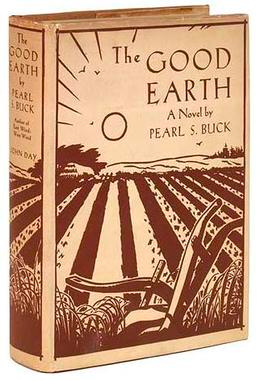Pearl Buck was born as Pearl Comfort Sydenstricker on June 26, 1892, in Hillsboro, West Virginia. She spent most of her young life until the age of forty in China as the daughter of Presbyterian Christian missionaries in Zhenjiang (Jiangsu province), then a small city lying at the junction of the Yangtze River and the Grand Canal.
She was fluent in Chinese and American and got her college education in a women’s college in West Virginia. She had begun to write essays and stories in magazines in the 1920s. The Good Earth was her second novel published in 1931; it became a best-seller in 1931-32, won the Pulitzer Prize, and the Howells Medal in 1935.
The Good Earth, First Edition 1931, published by John Day
It was adapted as a major MGM film in 1937 featuring Paul Muni as Wang Lung the farmer, and Louise Rainer as O-lan, his wife.
Wang Lung, though born as a poor peasant barely making a living on a farm, has ambitions, derived from a fierce love of the land. Land, he thinks it the only asset that survives famines, bad times, and the depredations of the warlords. Through all the hardships he makes headway, finding in his wife the sort of helpmate who propels him forward while taking care of his domestic needs and their familial obligations to elders.
Indeed it is she who in a moment of luck carts away a bag of jewels and bullion secreted in a cache in the Great House of the local overlord and mistress, when their wastrel family fell on bad times. O-lan asks only to keep two pearls, handing over the bag to Wang Lung. He lets her keep it; O-lan, however, did not want to wear it ostentatiously, but keep it as a store of wealth against future adversity. Sadly, Wang Lung later plucks it away from her to present to his mistress, the beauty of the local whorehouse, Lotus.
Toward the end of the novel when Wang Lung finds himself alone, surrounded by quarrelling members of his family after his wife’s death, he sorely regrets that he had snatched away the small gift O-lan wanted to retain.
O-lan may be seen as the real story Pearl Buck wanted to tell: of women who were the true up-builders of the family and community, toiling without ceasing, barely acknowledged, rarely rewarded, and entirely subservient to men. Bearing children, caring for elders, and husbanding meagre farm resources so that the children would have a better life – this was the life of rural women.
All this, of course, changed with the revolution. Women are no longer uneducated. Women are no longer tied to serial child-bearing. They do not even have to marry, if they do not want to, and increasingly in modern China it is hard for a man to get a woman to say Yes! But all this advance does not mean patriarchy has disappeared. As this article, Patriarchy in China, notes, men still dominate in the political sphere even today, although women have equal economic power. Foot binding has been eliminated totally and arranged marriages are extremely rare.
.png)


